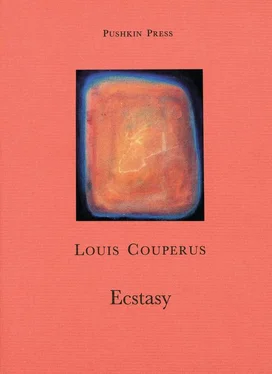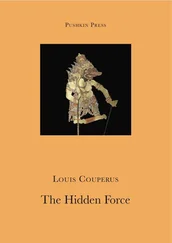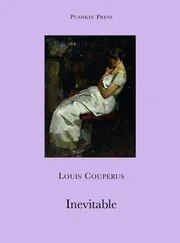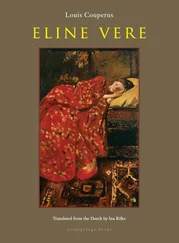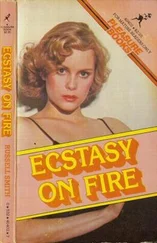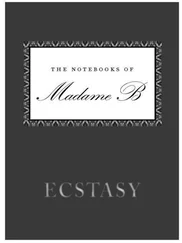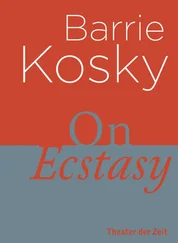“Auntie!” cried Jules. “Auntie!”
He shook her by the arm, and she waked heavily, with heavy, blue-encircled eyes. She did not recognise him at first, and thought that he was little Dolf.
“It is I, Auntie; Jules …”
She recognised him, asked him how he came there, what was the matter, whether he did not know that she was ill.
“I knew, but I wanted to speak to you. I came to speak to you about … him …”
“Him?”
“About Taco. He asked me to tell you. He could not write to you. He is going on a long journey with his friend from Brussels; he will be away a long time, and he would like … he would like to take leave of you.”
“To take leave?”
“Yes, and he told me to ask you whether he might see you once more?”
She had half risen up, and looked at Jules stupidly. In an instant the memory ran through her brain of a long look which Jules directed on her so strangely when she saw Quaerts for the first time and spoke to him coolly and distantly: “Have you many relations in the Hague? You have no occupation I believe? Sport?” The memory of Jules playing on the piano, of Rubinstein’s Romance in E , of the ecstasy of his fantasia: the glittering rainbows and the souls turning to angels.
“To take leave?” she repeated.
Jules nodded. “Yes, Auntie, he is going away for a long, long time.”
He could have shed tears himself, and there were tears in his voice, but he would not, and his eyes were moist.
“He told me to ask you,” he repeated with difficulty.
“Whether he can come and take leave?”
“Yes, Auntie.”
She made no reply, but lay staring before her. An emptiness began to measure itself out before her, in endless perspective, a silhouette of their evening of rapture, but no light beamed out of the shadow.
“Emptiness …” she muttered through closed lips.
“What, Auntie?”
She would have liked to ask Jules whether he was still, as formerly, afraid of the emptiness within himself; but a gentleness of pity, a soft feeling, a sweetening of the bitterness which so filled her being, stayed her.
“To take leave?” she repeated, with a smile of melancholy, and the big tears fell heavily, drop by drop, upon her fingers wrung together.
“Yes, Auntie …”
He could no longer restrain himself: a single sob convulsed his throat, but he gave a cough to conceal it. Cecile threw her arm round his neck.
“You are very fond of Taco … are you not?” she asked; and it struck Cecile that this was the first time she had pronounced the name, for she had never called Quaerts by it: she had never called him by any name.
He did not answer at first, but nestled in her arm, in her embrace, and began to cry.
“Yes, I cannot tell you how much,” he said.
“I know,” she said, and she thought of the rainbows and the angels; he had played as out of her own soul.
“May he come?” asked Jules, faithfully thoughtful of his instructions.
“Yes.”
“He asks whether he may come this evening?”
“Very well.”
“Auntie, he is going away, because … because …”
“Because what, Jules?”
“Because of you; because you do not like him, and will not marry him. Mamma says so …”
She made no reply; she lay sobbing, her head on Jules’ head.
“Is it true, Auntie? No, it is not true, is it … ?”
“No.”
“Why, then?”
She raised herself suddenly, conquering herself, and looked at him fixedly.
“He is going away because he must, Jules. I cannot tell you why. But what he does is right. All that he does is right.”
The boy looked at her, motionless, with large, wet eyes, full of astonishment.
“Is right?” he repeated.
“Yes. He is better than any of us. If you continue to love him, Jules, it will bring you happiness, even if … if you never see him again.”
“Do you think so?” he asked. “Does he bring happiness? Even in that case …”
“Even in that case …”
She listened to her words as she spoke them: it was to her as if another was speaking; another who consoled not only Jules but herself as well, and who would perhaps give her strength to take leave from Taco as would be seemly – without despair.
IV
“So you are going a long journey?” she asked.
He sat facing her, motionless, with anguish on his face. Outwardly she was very calm, only there was melancholy in her look and in her voice. In her white dress, with the girdle falling before her feet, she lay back among the three cushions of the rose-moiré chaise-longue ; the points of her little slippers were lost in the sheepskin rug. On the little table before her lay a great bouquet of loose roses, pink, white, and yellow, bound together with a broad ribbon. He had brought them for her, and she had not yet placed them. There was great calm about her; the “exquisite” atmosphere of the boudoir seemed unchanged.
“Tell me, do I not grieve you sorely?” he asked, with the anguish in his eyes, the eyes she now knew so well.
She smiled.
“No …” she said. “I will be honest with you. I have suffered, but I suffer no longer. I have battled with myself for the second time, and I have conquered myself. Will you believe me?”
“If you knew the remorse that I feel …”
She rose and went to him.
“Why?” she asked in a clear voice. “Because you comprehended me, and gave me happiness?”
“Did I do so?”
“Have you forgotten, then?”
“No, but I thought …”
“What?”
“I do not know; I thought that you would – would suffer so, I … I cursed myself …!”
She shook her head gently, with smiling disapproval.
“For shame!” she said. “Do not blaspheme …”
“Can you forgive me?”
“I have nothing to forgive. Listen to me. Swear to me that you believe me, that you believe that you have given me happiness and that I am not suffering.”
“I … I swear.”
“I trust you do not swear this merely to comply with my wish.”
“You have been the highest in my life,” he said, gently.
A rapture shot through her soul.
“Tell me only …” she began.
“What?”
“Tell me if you believe that I, I, I … shall always remain the highest in your life.”
She stood before him, tall, in her clinging white. She seemed to shed radiance; never yet had he seen her so beautiful.
“I am certain of that,” he said. “Certain, oh! Certain … My God! how can I convey the certainty of it to you?”
“But I believe you, I believe you,” she exclaimed.
She laughed a laugh of rapture. In her soul a sun seemed to be shooting out rays on every side. She placed her arm tenderly about his neck and kissed his forehead, a caress of chastity.
For one moment he seemed to forget everything. He too rose, took her in his arms, almost savagely, and clasped her suddenly to him, as if he were about to crush her against his breast. She just caught sight of his sad eyes, and then nothing more, blinded by the kisses of his mouth, which rained upon her whole face in sparks of fire. With the sun-rapture of her soul was mingled a bliss of earth, a yielding to the violence of his embrace. She released herself, put him away, and said:
“And now … go.”
It stunned him; he understood that to be final.
“Yes, yes, I am going,” he said. “I may write to you, may I not?”
She nodded yes, with her smile.
“Write to me, I will write to you too,” she said. “Let me always hear from you …”
“Then these are not to be the last words between us? This … this … is not the end?”
“No …”
“Thank you. Goodbye, Mevrouw, goodbye … Cecile. Ah! if you knew what this moment costs me!”
Читать дальше
